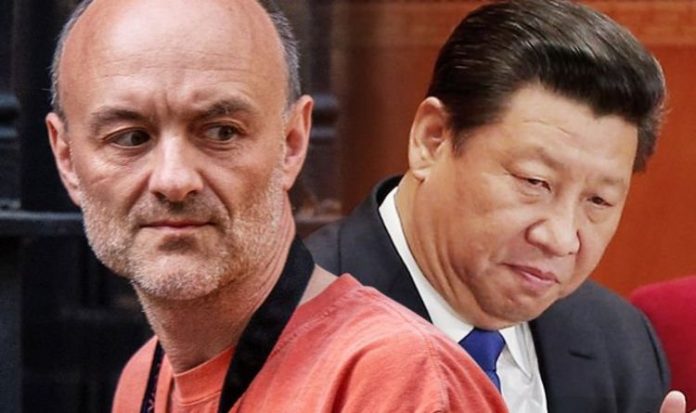In late July, Prime Minister Boris Johnson performed a U-turn and announced that Huawei products would be banned from the UK and all products currently existing would have been removed from Britain’s infrastructure by 2027. Resisting heavy pressure from US President Donald Trump, as well as from his own MPs, in January, Mr Johnson had controversially allowed the Chinese tech firm to be involved with the UK’s 5G network, which is in development. Mr Johnson admitted the firm was a “high risk vendor” but allowed it to have some access to the UK’s 5G network after being told by the UK’s security agencies that they could manage the risk posed by Huawei.
However, less than a year later, the Prime Minister found himself revisiting that decision.
A key reason could be that the Trump administration has continued what one UK official calls a campaign of “unrelenting pressure” on the company. US officials have claimed China could use the firm as a gateway to “spy, steal or attack” the UK.
Moreover, attitudes to China have hardened in the last six months, with the coronavirus crisis – and Beijing’s handling of it – increasing concerns about dependencies on the communist country.
As the U-turn has been welcomed by many Huawei critics in Britain, a throwback column by the Prime Minister’s chief adviser, Dominic Cummings, suggests he might not have been among them.
Mr Cummings claimed China’s renaissance was “a fearsome threat to the West”.
However, he argued that in order to create an alternative focus to nationalist antagonism, projects in which countries work together are essential.
He wrote: “Every day on his way to work at Harvard, Professor Allison wondered how the reconstruction of the bridge over Boston’s Charles River could take years while in China bigger bridges are replaced in days.
“His book tells the extraordinary story of China’s transformation since Deng abandoned Mao’s catastrophic Stalinism, and considers whether the story will end in war between China and America.
JUST IN: Vote Leave’s ‘secret weapon’ was obscure Canadian firm
“China’s economy doubles roughly every seven years; it is already the size of America’s and will likely dwarf it in 20 years. More serious than Europe, it invests this growth in education and technology from genetic engineering to artificial intelligence.
“Allison analyses the formidable President Xi, who has known real suffering and is very different to western leaders obsessed with the frivolous spin cycles of domestic politics.
“Xi’s goal is to ensure that China’s renaissance returns it to its position as the richest, strongest and most advanced culture on earth.
“Allison asks: will the US-China relationship repeat the dynamics between Athens and Sparta that led to war in 431BC or might it resemble the story of the British-American alliance in the 20th century?”
In Thucydides’ history, Mr Cummings noted in his 2017 Spectator column, the dynamic growth of Athens caused such fear that, amid confusing signals in an escalating crisis, Sparta gambled on preventive war.
The Brexit guru continued: “China has invested in weapons with powerful asymmetric advantages: cheap missiles can sink an aircraft carrier costing billions, and cyber weapons could negate America’s powerful space and communication infrastructure.
“American war-games often involve bombing Chinese coastal installations. How far might it escalate?
DON’T MISS:
Macron’s ‘tough-guy’ stance on Brexit exposed [INSIGHT]
How German court struck EU blow and assisted even BETTER Brexit [REVEALED]
UK’s exciting new role in Indo-Pacific region explained [ANALYSIS]
“Terrifying near misses have already happened, and we have been saved by individuals’ snap judgments. They have occurred, luckily, during episodes of relative calm. Similar incidents during an intense crisis could spark catastrophe.”
Mr Allison, Mr Cummings added, hopes Washington will rediscover its Forties seriousness, when it built a strategy and institutions to contain Stalin.
Giving examples, the special adviser wrote: “It could drop security guarantees to Taiwan to lower escalation risks. It could promote new institutions to tackle destructive technology and terrorism. Since China will upend post-1945 institutions anyway, why not try to shape what comes next together?
“Perhaps, channelling Sun Tzu, the West could avoid defeat by not trying to ‘win’.”
However, Mr Cummings concluded, it is hard to see how the necessary leadership might emerge.
He said: “We need government teams capable of the rare high performance we see in George Mueller’s NASA, which put man on the Moon; or in Silicon Valley, entrepreneurs such as Sam Altman and Patrick Collison.
“This means senior politicians and officials of singular ability and with different education, training and experience.
“It means extremely adaptive institutions and state-of-the-art tools, not the cabinet processes that failed in 1914. It means breaking the power of self-absorbed parties and bureaucracies that evolved before nuclear physics and the internet.
“New leaders must build institutions for global cooperation that can transcend Thucydides’ dynamics.
“For example, the plan of Jeff Bezos, Amazon’s CEO, to build a permanent Moon base in which countries work together to harness the resources of the solar system is the sort of project that could create an alternative focus to nationalist antagonism.”







